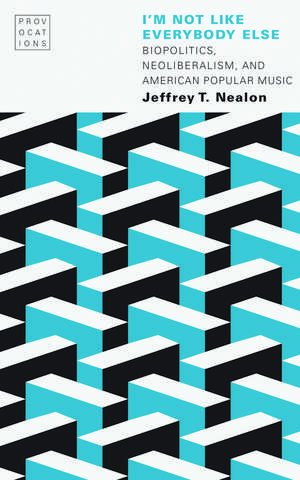I'm Not Like Everybody Else: Biopolitics, Neoliberalism, and American Popular Music: Provocations
Autor Jeffrey T. Nealonen Limba Engleză Paperback – 30 sep 2018
Despite the presence of the Flaming Lips in a commercial for a copier and Iggy Pop’s music in luxury cruise advertisements, Jeffrey T. Nealon argues that popular music has not exactly been co-opted in the American capitalist present. Contemporary neoliberal capitalism has, in fact, found a central organizing use for the values of twentieth-century popular music: being authentic, being your own person, and being free. In short, not being like everybody else.
Through a consideration of the shift in dominant modes of power in the American twentieth and twenty-first centuries, from what Michel Foucault calls a dominant “disciplinary” mode of power to a “biopolitical” mode, Nealon argues that the modes of musical “resistance” need to be completely rethought and that a commitment to musical authenticity or meaning—saying “no” to the mainstream—is no longer primarily where we might look for music to function against the grain.
Rather, it is in the technological revolutions that allow biopolitical subjects to deploy music within an everyday set of practices (MP3 listening on smartphones and iPods, streaming and downloading on the internet, the background music that plays nearly everywhere) that one might find a kind of ambient or ubiquitous answer to the “attention capitalism” that has come to organize neoliberalism in the American present. In short, Nealon stages the final confrontation between “keepin’ it real” and “sellin’ out.”
Through a consideration of the shift in dominant modes of power in the American twentieth and twenty-first centuries, from what Michel Foucault calls a dominant “disciplinary” mode of power to a “biopolitical” mode, Nealon argues that the modes of musical “resistance” need to be completely rethought and that a commitment to musical authenticity or meaning—saying “no” to the mainstream—is no longer primarily where we might look for music to function against the grain.
Rather, it is in the technological revolutions that allow biopolitical subjects to deploy music within an everyday set of practices (MP3 listening on smartphones and iPods, streaming and downloading on the internet, the background music that plays nearly everywhere) that one might find a kind of ambient or ubiquitous answer to the “attention capitalism” that has come to organize neoliberalism in the American present. In short, Nealon stages the final confrontation between “keepin’ it real” and “sellin’ out.”
Preț: 172.94 lei
Nou
Puncte Express: 259
Preț estimativ în valută:
33.10€ • 34.43$ • 27.32£
33.10€ • 34.43$ • 27.32£
Carte tipărită la comandă
Livrare economică 14-28 aprilie
Preluare comenzi: 021 569.72.76
Specificații
ISBN-13: 9781496208651
ISBN-10: 149620865X
Pagini: 144
Dimensiuni: 127 x 203 x 10 mm
Greutate: 0.16 kg
Editura: Nebraska
Colecția University of Nebraska Press
Seria Provocations
Locul publicării:United States
ISBN-10: 149620865X
Pagini: 144
Dimensiuni: 127 x 203 x 10 mm
Greutate: 0.16 kg
Editura: Nebraska
Colecția University of Nebraska Press
Seria Provocations
Locul publicării:United States
Notă biografică
Jeffrey T. Nealon is Edwin Erle Sparks Professor of English and Philosophy at Pennsylvania State University. He is the author of several books, including Foucault Beyond Foucault: Power and Its Intensifications since 1984 and Post-Postmodernism: or, The Cultural Logic of Just-in-Time Capitalism.
Cuprins
Acknowledgments
Provocations
Introduction
1. Biopower Blues
2. Steal Your Face
3. Not for Sale
4. A Genealogy of Popular Music and Authenticity; or, You Can Fake the Funk
5. Good Rockin’ Tonite
6. Musical Community, from In- to Excorporation
7. Capitalism, from Meaning to Usage
8. In the Mood
9. Will There Be Music
10. Bourdieu, Bourdon’t
11. Everywhere, All the Time
Notes
Provocations
Introduction
1. Biopower Blues
2. Steal Your Face
3. Not for Sale
4. A Genealogy of Popular Music and Authenticity; or, You Can Fake the Funk
5. Good Rockin’ Tonite
6. Musical Community, from In- to Excorporation
7. Capitalism, from Meaning to Usage
8. In the Mood
9. Will There Be Music
10. Bourdieu, Bourdon’t
11. Everywhere, All the Time
Notes
Recenzii
"Nealon is right that musical discourse must change. It must recognize the way that music is listened to now and how it is used."—Barry Shank, Cultural Critique
“This project clears a path through the stalemate of the ‘authenticity’ (an enduring watchword of most popular musicological scholarship) debate and boldly goes where few others have dared to go. As the new musicology moves to make sense of its relation to sound studies, this kinky little book is likely to emerge as an important, if vexed, touchstone.”—John Mowitt, leadership chair in the critical humanities at the University of Leeds and author of Sounds: The Ambient Humanities













